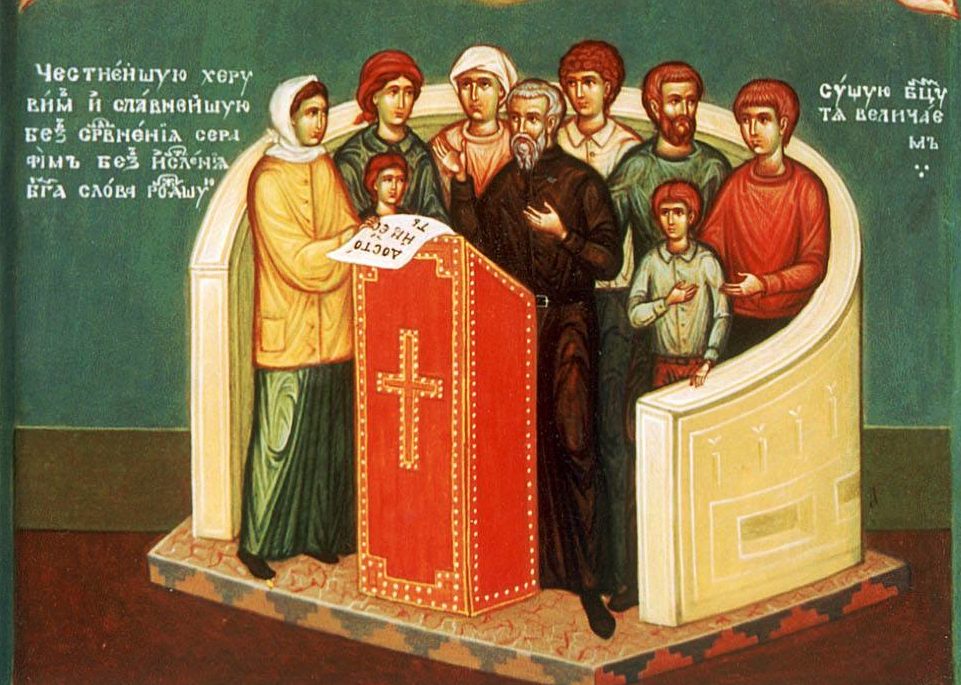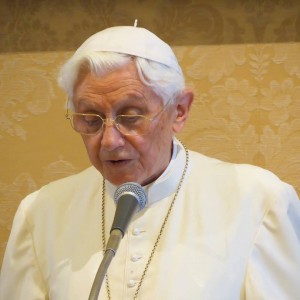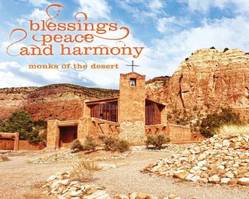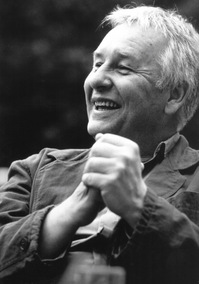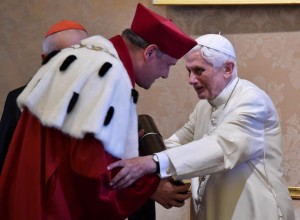
Pope Benedict was conferred with a Doctorate Honoris Causa from the John Paul II Pontifical University of Krakow and from the Academy of Music of Krakow, Poland. The honors were bestowed on the emeritus pope at Castel Gandolfo on July 6, 2015. With his usual clarity the Pope said:
At this moment, I cannot but express my greatest and most cordial gratitude for the honor you have given me conferring the Doctoratus Honoris Causa. I thank the Grand Chancellor, his dear Eminence Cardinal Stanislaw Dziwisz, and the academic Authorities of both Athenaeums. I rejoice above all over the fact that in this way my bond with Poland, with Krakow, with the homeland of our great Saint John Paul II has become more profound, because without him, my spiritual and theological journey would not have even been imaginable. With his brilliant example he also showed us how the joy of great sacred music and the task of common participation in the sacred liturgy, the solemn joy and the simplicity of the humble celebration of the faith can go hand in hand.
In the years after the Council, on this point a very old disagreement was manifested with renewed passion. I myself grew up in the Salisburghese marked by the great tradition of this city. It was a given here that Sunday Masses accompanied by the choir and orchestra were an integral part of our experience of the faith in the celebration of the liturgy. Indelibly impressed in my memory, for instance, is how, when the first notes of Mozart’s Coronation Mass sounded, Heaven virtually opened and the presence of the Lord was experienced very profoundly. And thanks also to you, who enabled me to hear Mozart and also the Choir for the great songs! Beside this, however, already present in any case also was the new reality of the Liturgical Movement, especially through one of our chaplains who later became Vice-Regent and then Rector of the Major Seminary of Freising. Then, during my studies at Monaco of Bavaria, I entered ever more concretely in the Liturgical Movement through the lessons of Professor Pascher, one of the most significant experts of the Council in liturgical matter, and above all through the liturgical life in the community of the Seminary. Thus little by little the tension became perceptible between the participatio actuosa in keeping with the liturgy and the solemn music that enveloped the sacred action, even if it was not yet perceived so strong.
Written very clearly in the Constitution on the Liturgy of Vatican Council II is that “The patrimony of sacred music be preserved and incremented with great care” (1124). On the other hand, the text evidences, as a fundamental liturgical category, the participatio actuosa of all the faithful in the sacred action. What in the Constitution was still peacefully together, subsequently, in the reception of the Council was often in a relation of dramatic tension. Significant environments of the Liturgical Movement held that, for the great choral works and even for the Masses for orchestra there would be room in the future only in concert halls, not in the liturgy. Here there could be a place only for the common singing and prayer of the faithful. On the other hand, there was consternation over the cultural impoverishment of the Church, which would necessarily flow from this. In what way could both things be reconciled? How could the Council be implemented in its entirety? These were the questions posed to me and to many other faithful, to simple people as well as to persons in possession of theological formation.
At this point, it is right, perhaps, to pose the basic question: What is music in reality? From where does it come and what does it tend to?
I think that three “places” can be localized from which music flows.
One of the first sources is the experience of love. When men are seized by love, a new dimension of being opens in them, a new grandeur and breadth of reality, and it also drives one to express oneself in a new way. Poetry, singing and music in general stem from this being struck, by this opening of oneself to a new dimension of life.
A second origin of music is the experience of sadness, being touched by death, by sorrow and by the abysses of existence. Opened also in this case, in an opposite direction, are new dimensions of reality that can no longer find answers in discourses alone.
Finally, the third place of origin of music is the encounter with the divine, which from the beginning is part of what defines the human. All the more so here in which the totally other and the totally great is present, which arouses in man new ways of expressing himself. Perhaps, it is possible to affirm that in reality also in the other two ambits – love and death – the divine mystery touches us and, in this sense, it is the being touched by God that, overall, constitutes the origin of music. I find it moving to observe how, for instance, in the Psalms singing is no longer enough for men — an appeal is made to all the instruments: reawakened is the hidden music of creation, its mysterious language. With the Psalter, in which the two motives of love and death also operate, we find directly the origin of sacred music of the Church of God. It can be said that the quality of the music depends on the purity and the grandeur of the encounter with the divine, with the experience of love and of pain. The more pure and true this experience is, the more pure and great also is the music that is born and develops from it.
At this point, I would like to express a thought that has gripped me increasingly, all the more so in as much as the different cultures and religions enter into relation among themselves. Present in the ambit of the different cultures and religions is great literature, great architecture, great painting and great sculptures. And everywhere there is also music. And yet in no other cultural ambit is there music of equal grandeur to that born in the ambit of the Christian faith: from Palestrina to Bach, to Handle, up to Mozart, Beethoven and Bruckner. Western music is something unique, which has no equal in other cultures. And this – it seems to me – should make us think.
Certainly, Western music goes beyond by far the religious and ecclesial ambit. And yet it finds its most profound origin, in any case, in the liturgy of the encounter with God. In Bach, for whom the glory of God represents ultimately the end of all music, this is altogether evident. The great and pure answer of Western music was developed in the encounter with that God that, in the liturgy, makes himself present to us in Christ Jesus. For me, that music is a demonstration of the truth of Christianity. Wherever such an answer is developed, there has been an encounter with truth, with the true Creator of the world. Therefore, great sacred music is a reality of theological rank and of permanent meaning for the faith of the whole of Christianity, even if it is not necessary that it be performed always and everywhere. On the other hand, however, it is also clear that it cannot disappear from the liturgy and that its presence can be an altogether special way of participation in the sacred celebration, in the mystery of the faith.
If we think of the liturgy celebrated by Saint John Paul II on every continent, we see all the breadth of the expressive possibilities of the faith in the liturgical event; and we also see how the great music of the Western tradition is not foreign to the liturgy, but is born and grows from it and in this way contributes ever again to give it form. We do not know the future of our culture and of sacred music. However, there is something that seems clear to me: where there is really an encounter with the living God who comes to us in Christ, born and growing there again is the answer, whose beauty comes from truth itself.
The activity of the two universities that confer on me – that have conferred on me – this Doctorate Honoris Causa – for which I can say again my wholehearted thank you – represents an essential contribution so that the great gift of music, which comes from the tradition of the Christian faith, may remain alive and be of help in order that the creative force of faith is not extinguished also in the future. For this, I thank you all wholeheartedly, not only for the honor that you have bestowed on me, but also for all the work you carry out at the service of the beauty of the faith. May the Lord bless you all.
